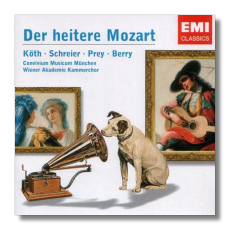
The Internet's Premier Classical Music Source
Related Links
- Mozart Reviews
- Latest Reviews
- More Reviews
-
By Composer
-
Collections
DVD & Blu-ray
Books
Concert Reviews
Articles/Interviews
Software
Audio
Search Amazon
Recommended Links
Site News
 CD Review
CD Review
Wolfgang Mozart

Der heitere Mozart
- Komm, liebe Zither, K 351 (367b)
- Caro mio Druck und Schluck, K Anh. 5 (571a)
- Die Zauberflöte, K 620: Nur stille…Die Strahlen der Sonne
- Difficile lectu mihi mars, K 559
- Das gestöre Ständchen, K Anh. 441c
- Canon à 3 in F Major, K 508
- Canon à 3 in F Major, K 507
- Lieber freistädler, K 232 (509a)
- Im Grab ists finster, K Anh. 6 (441b)
- Liebes Mandel, wo is's Bandel, K 441
- O Du eselhafter Peierl! in A Major, K 560a (559a)
- Brüder, lasst uns lustig sein, K 344
- Nun, Liebes Weibchen, K 592a
- Gehn wir im Prater, K 558
- Za´de, K 344 (334b): Wer hungrig bei der Tafel sitzt
- Essen und Trinken, K 234 (382e)
- Warnung, K 433 (416c)
- Bona nox! bist a rechta Ox, K 561
- Eine musikalischer Spass, K 522
- Verewight glüht hier Herz un Sinn by Johann Ludwig Krebs
Erika Köth, soprano
Peter Schreier, tenor
Hermann Prey, baritone
Walter Berry, bass-baritone
Convivium Musicum München
Wiener Akademie Kammerchor
Members of the Sinnhoffer Kammerorchester München
EMI Classics 586879-2 ADD 66:33
In 1991, we commemorated the 200th anniversary of Mozart's death, and just 15 years later we are celebrating his 250th birthday – another great opportunity for the record companies. Fifteen years ago the classical recording industry was doing quite well, and we were treated to massive projects such as Philips Classics' massive Complete Mozart Edition. This time around the pickings are liable to be considerately slimmer. Many new releases and reissues are in the works though, and this reissue of Der heitere Mozart ("The Lighter Mozart") will delight many listeners.
Those who know about Mozart only from the play or movie have an incomplete and somewhat incorrect idea of who he was, but one thing that got right is that Mozart had an excellent (although sometimes crude or even insulting) sense of humor. Der heitere Mozart is a collection of short vocal works for one to four voices or small chorus. One of the most infamous selections included here is the vocal canon Difficile lectu mihi Mars. The Latin text is innocent enough, but to ears used to Viennese German, it sounds as if the singers are exhorting listeners to "lick my ass." (Mozart actually wrote a different canon – not recorded here! – with the German title Leck mich im Arsch.) These and other works suggest that Mozart was a man who loved simple pleasures – food, alcohol, loving, breaking wind, and a good laugh with (or at the expense of!) family and friends. Unfortunately, no texts have been provided with this reissue, so listeners need to be familiar with German if they are to appreciate Der heitere Mozart fully. (EMI Classics should have made the texts and translations available on their website, as the label has done with other releases.) The soloists are like a "Who's Who" among Mozart singers in the Viennese style from the 1960s and 70s. The performances are polished but chummy, which will make those who don't understand German even more frustrated. The Wiener Akademie Kammerchor and Convivium Musicum München are appropriately deadpan.
Ein musikalischer Spass ("A Musical Joke") is a work finished in1787 in which Mozart makes fun of incompetent composers and inept performers. The humor is subtle much of the time, but not always, and audiences always laugh at the out-of-kilter horn writing in the Menuetto, and also at the grating dissonances which bring the work to a close. The work is scored for two violins, viola, double bass, and two horns – itself an invitation to disaster. The members of the Sinnhoffer Kammerorchester München also play the work with a straight face – which makes it funnier, of course.
These recordings were made in Munich in 1966 and 1973; the engineering remains first-class. At the budget "Encore" price, this CD is appealing, but the paucity of documentation is almost as frustrating as the complete absence of texts and translations. Was the omission for budgetary reasons, or was EMI afraid of offending prudes and prigs?
Copyright © 2006, Raymond Tuttle




















